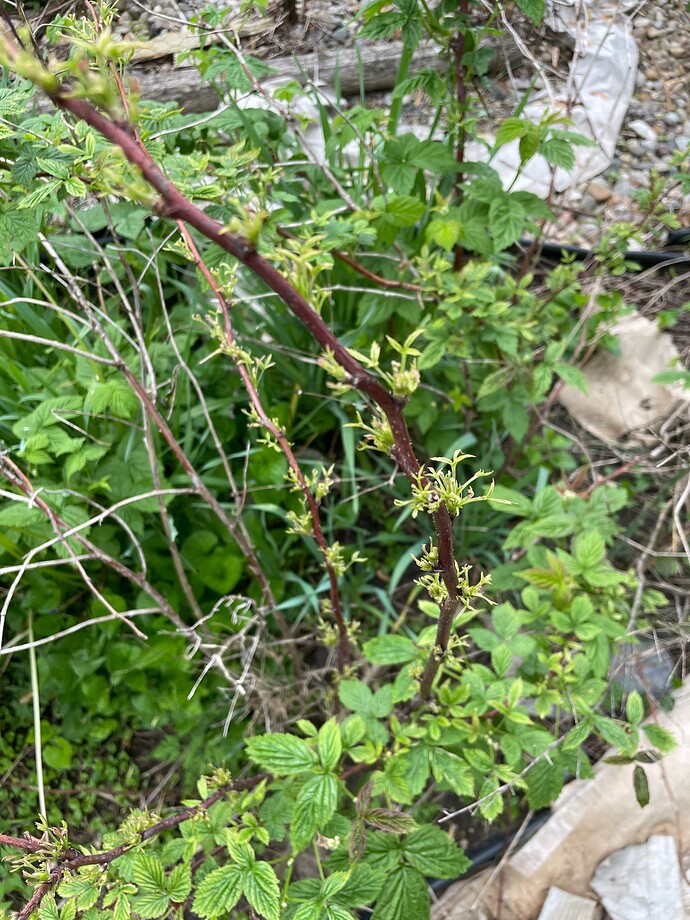I got a bramble of red raspberries that came with the house. At the very least 5 years old, possibly much older. For the last 4 summers it has been productive. This spring I started noticing slow developing canes, and by now the difference between the leaves of the jelly canes and the slow ones is obvious. The sick ones have very small, skinny, yellow leaves. They don’t look like the pictures I found for raspberry viruses, but I think that is the most logical explanation. If they are viruses, what do I do? Cut the sick canes and leave the others, or burn it to the ground? Can I replant or is the spot out of bounds for other cane fruit? It is such a shame. Thank you in advance for the advice.
Could you have a nitrogen deficiency? Have you done a soil test? Is there a good mulch layer around the canes?
Additionally I know the common practice is to thin weak canes and have the strong ones as the fruiting canes.
Perhaps the most common cause of yellow leaves on raspberry plants is chlorosis caused by nutrient deficiencies. Planting raspberries in a fertile soil enriched with well-rotted manure and a general fertiliser will go a long way in helping prevent chlorosis.
With my Apricots, I read that Zinc deficiency can cause new leaves to come out yellow.
Herbicide exposure?
I concur with @Squiggy - Looks like herbicide damage. Did you use compost, grass clippings, straw or hay on or around those plants in the past year? It doesn’t look like RBDV or phytophthora, which are the most common raspberry diseases where I live. I’d prune out the damaged and dead canes - they aren’t going to recover. The other canes will probably be ok.
I checked, and it looks similar to images of damage by Glyphosate, often found on Roundup.
Here is a link to look at images: Recognizing Glyphosate Injury on Small Fruit Crops | Fruit Pathology Laboratory
Note: nobody is being mean or wagging a finger at you, in case you fear replying to this. I am sure we all would like to know what you think caused the damage, and if you recall anybody spraying the lawn for weeds in the past few months. It could even be your neighbors spraying that impacted it.
I had damage once to grape leaves due to spraying in grass about 3 feet from them.
Thank you all for the thoughtful replies. I’m glad that the consensus seems to be no virus but maybe nutrient deficiency or herbicides damage. I went ahead and put general fertilizer (15-5-10 plus micros) in the beds. I have not done a soil test in the garden, but a site nearby at a nitrogen depletion experiment still gets high to moderate nitrogen in the soil test even after 6 years on no fertilizer corn. Because of that I kind of assumed my soil had plenty of N. But maybe I’m missing a micro. What I find strange is that a cane is looking bad right next to a healthy one. If is herbicide drift or nutrients, why aren’t both affected? There was no glyphosate application on the beds, but I applied with a hood elsewhere in the lawn. Maybe 3 weeks ago. So that is a possibility although it was quite away. And I don’t think the farms near by have started applying dicamba. Now that is a killer for grapes and other fruit trees. Very volatile and even micro doses cause leaf cupping and other deformities. It really should not have been in the market before they understood better the extend of the drift problem.
Rant over. Thank you again for the replies. I’ll mulch and remove the weak canes, and see if that fixes the problem. I am glad I don’t have to destroy the berry patch.
That looks like herbicide symptoms to me. I see this often on feral blackberry vines that have been sprayed. It doesn’t kill them immediately, but the new growth that emerges after being sprayed looks like this. Given that a mature patch of raspberries will not be fully interconnected underground, it is possible for only part of the canes to be affected. The herbicide probably only got on part of them and simply isn’t affecting the part of the patch that’s not physically connected to the canes that came in contact with the herbicide.
The affected canes end up dying, but the rest is now healthy and loaded with fruit. Does not seem to be any spread of the symptoms, so herbicide damage is indeed the most likely culprit. Thank you all!

